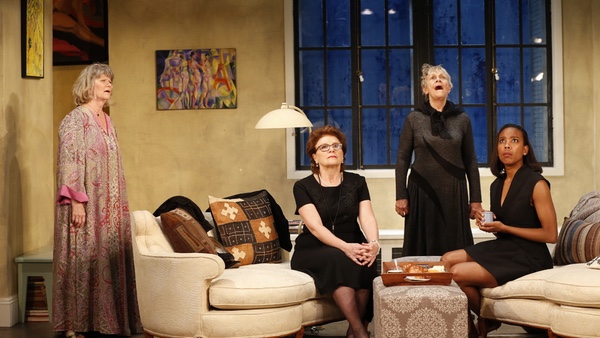1950s Paris, Set to the Music of the Everly Brothers

Judith Ivey, Angelica Fiordellisi, Estelle Parsons and Francesca Choy-Kee (Carol Rosegg)
You just have to love people whose best memories of Paris in the 1950s were the songs of the Everly Brothers.
The women in veteran playwright Israel Horovitz’s new comedy Out of the Mouths of Babes, that just opened at the Cherry Lane Theater, Commerce e Street, in New York, have little use for the Eiffel Tower, Napoleon’s Tomb, the Louvre or either the left or right bank of the Seine. All they want to do is hum the early rock and roll music of Don and Phil Everly, who were popular in entertainment in that era (“Bye, Bye Love.” “All I Have to Do is Dream,” “Wake Up, Little Susie”). The songs of the musical brothers fill the air in the theater, as does the joy of this delightful new comedy about four former wives and lovers of a 100 year old man who just died and invited them to his funeral. There, the women, face to face for the first time, argue about beliefs, tell tales and reminisce about Paris in the 1950s through the 1990s. And they delight in carving up each other and then, arm in arm, go after the other women in his life, too.
From the first to last moment, Out of the Mouths of Babes is an hysterically funny, and yet loving and tender, play about four gritty women who spin stories of history in Paris and several American cities, too (there is even a nod to Bayonne, New Jersey). The actresses are outstanding. Oscar winner Estelle Parsons plays Evelyn, 88, the girlfriend from the 1950s, Judith Ivey plays 68 year old Evvie, Angelina Fiordellisi is screwball Janice (who had an affair with her psychiatrist at the same time he was having an affair with her mother) and Francesca Choy-Kee, who plays ditzy Marie-Belle. They are an ensemble of hilarity.
The plot of the story is simple. Well, there isn’t really much of a plot. The women just talk to each other as they plan the next day’s funeral. All of the old grudges and jealousies are dragged out of more than 60 years of history in that one bedroom apartment in Paris that overlooks a canal.
There are some funny stories, such as Janice’s suicidal leap out of the window. She had all intentions of killing herself but landed in a pile of linen on a laundry cart and got off of it without a scratch, never to leap away again (well … sort of never).
There are secrets between the women. There are discoveries, too, such as the fact that there were two Snookies in the old boy’s French “little black book” of women’s phone numbers. One was a real woman named Snookie and another was a woman whose nickname was Snookie.
There is some trouble, such as the acknowledgment that the deceased probably started sleeping with one woman before she was 18 and always had a yen for young women.
The women, all of them, loved the deceased. They fill the play with little stories about how they fit into his life and the life he gave them over sixty years.
Director Barnet Kellman has done a fine job in staging the play. He is particularly successful at working with the women on their timing. There is a line and then, long pause for time effect, a sharp punchline. The women sit and stand, turn their heads and move their bodies with great precision.
The only problem of the play is keeping up with who is who in the cast. You are told that some of these women were married to the deceased music professor and that some were his lovers. He had wives and lovers at the same time, too. Late in the play, you learn that he had yet a fifth woman, wife Maxine, who was gunned down by Paris police in a bizarre shooting at a bank where she was just trying to deposit money and was accidentally killed. As you watch the story unfold on stage you get mixed up with the women’s backgrounds. That one was a wife; no, she was just a girlfriend. Or was she the wife? Girlfriend first and then wife? That should be clearer.
Horovitz might have added some Paris history to the play, too. Paris in the late 1960s, as an example, was as chaotic as the U.S. that year, with a multitude of strikes, riots and student protests. He might have told us more about the legendary Sorbonne, too.
What the playwright has put together is an enchanting, and very funny, personal history of a man who lived through a century. It is a century of history in which a man, and all of his women, laughed and cried and forged an engaging family history.
PRODUCTION: The play is produced by the Cherry Lane Theatre, in association with Julie Crosby, Margarida De Brito and David Youse. Sets: Neil Patel, Costumes: Joseph D. Aulisi, Lighting: Paul Miller, Sound: Leon Rothenberg. The play is directed by Barnet Kellman. It runs through July 17.